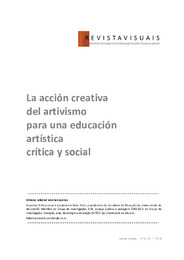Please use this identifier to cite or link to this item:
https://hdl.handle.net/11000/38354Full metadata record
| DC Field | Value | Language |
|---|---|---|
| dc.contributor.author | Sánchez Arenas, Bibiana de la Soledad | - |
| dc.date.accessioned | 2025-11-21T09:31:07Z | - |
| dc.date.available | 2025-11-21T09:31:07Z | - |
| dc.date.created | 2019-10-16 | - |
| dc.identifier.citation | Revista Visuais, volumen 5, número 1, 2019, pp. 23-42 | es_ES |
| dc.identifier.issn | 2447-1313 | - |
| dc.identifier.uri | https://hdl.handle.net/11000/38354 | - |
| dc.description.abstract | El presente artículo tiene la intención de realizar una aproximación sobre las prácticas artísticas recogidas dentro del neologismo artivismo (arte + activismo) y su posible vinculación con el contexto educativo durante la formación del profesorado de Educación Infantil de la Universidad de Murcia. Siendo el objetivo general, desarrollar la creatividad del alumnado hacia una acción crítica y social. Para ello, se utiliza la metodología ‘Investigación basada en las Artes’. El artista se convierte en investigador/mediador/facilitador/docente, y el artivismo en una herramienta idónea para que la comunidad educativa se exprese a través de narrativas artísticas contemporáneas como la instalación y el videoarte. Favorecido ello, la adquisición de competencias sociales y cívicas, al promover la reflexión crítica y creativa en el alumnado; y la recuperación de la comunicación entre el arte y el público en general, uniendo arte y vida, al romper los roles tradicionales dentro del ámbito académico. | es_ES |
| dc.description.abstract | The aim of this paper is to make an approach on the artistic practices collected within the neologism “artivism” (art + activism) and their possible link with the educational context during the training of Early Childhood Education teachers at the University of Murcia. Therefore, the overall objective is to develop students’ creativity towards critical and social action. In order to do so, the methodology ‘Arts Based Research’ be used. In this way, the artist becomes a researcher/mediator/facilitator/teacher and artivism becomes a key element for the education community to express itself through contemporary artistic narratives such as installations and video art. This helps acquire social and civic skills by encouraging critical and creative reflection in the students. It also re-establishes communication between art and the general public by breaking traditional roles within the academic field, thus bringing art and life together. | es_ES |
| dc.format | application/pdf | es_ES |
| dc.format.extent | 19 | es_ES |
| dc.language.iso | spa | es_ES |
| dc.publisher | Universidade Estadual de Campinas | es_ES |
| dc.rights | info:eu-repo/semantics/openAccess | es_ES |
| dc.rights | Attribution-NonCommercial-NoDerivatives 4.0 Internacional | * |
| dc.rights.uri | http://creativecommons.org/licenses/by-nc-nd/4.0/ | * |
| dc.subject | Artivismo | es_ES |
| dc.subject | Educación artística | es_ES |
| dc.subject | Instalación artística | es_ES |
| dc.subject | Videoarte | es_ES |
| dc.subject | Educación infantil | es_ES |
| dc.subject.other | CDU::7 - Bellas artes | es_ES |
| dc.title | La acción creativa del artivismo para una educación artística crítica y social | es_ES |
| dc.type | info:eu-repo/semantics/article | es_ES |
| dc.relation.publisherversion | https://doi.org/10.20396/visuais.v5i1.12134 | es_ES |

View/Open:
La acción creativa del artivismo para una educación.pdf
1,51 MB
Adobe PDF
Share:
.png)
